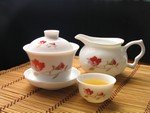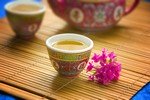Solving problems every tea drinker faces.
Exclusive subscriber benefits:
Receive four FREE quality ebooks worth $60
-
Save at least $5 during your first purchase
Tea expert Yuan Dishun compared 20 Chinese white teas for their chemical composition. He reported dried white tea contains 4% to 6% caffeine.
While quoted figures often vary wildly, tea generally has less than 5% caffeine. Contrary to popular belief, Yuan’s study demonstrates that white tea contains significant amount of caffeine.
Let me put it another way: it is widely accepted that tea contains half the amount of caffeine in coffee. This applies even to white tea. But the fact that it is a light-colored tea doesn’t mean it contains little or no caffeine.
This may seem strange for a white tea drinker. I drink it a few times a week, it is so sweet, so calming, that it is difficult to associate it with caffeine.
Well, it can, and as you will see later, caffeine is an indication of quality, and it might be better to have more than less caffeine.
As you will see later, it might be better to have a white tea with more caffeine.
White Tea Caffeine #1:
Withered Rather
Than Roasted
 A 2001 study by Yang
Weili illustrates the impact of white tea processing on its caffeine
content.
A 2001 study by Yang
Weili illustrates the impact of white tea processing on its caffeine
content.
White tea is made using a very special method.
After picking, fresh tea leaves are left to wither for up to 3 days.
Tea enzymes cause the leaves to mature, but factory conditions have to be precisely controlled to prevent oxidation from taking place.
Yang processed the same leaves using 6 methods: green, yellow, black, white, oolong and red. She then examined their chemical compositions.
She found that white tea contains the most caffeine (3.9%), follows by green tea (3.4%), yellow tea (3.1%) and oolong tea (3.1%).
Black tea and red tea have the least caffeine at 3.0% and 2.0% respectively.
White Tea Caffeine #2:
Increase With
Quality
High grade greens are made from younger tea shoots, and so have more caffeine than lower grade greens.
The same applies to white tea.
According to Yuan, the highest quality white tea - Silver Needle - contains 6.1% caffeine when naturally withered.
When artificial heat withered, its caffeine content reduces to 5.6%.
White Peony (Baimudan) has 5.7% caffeine. The Tribute Eyebrow (Gongmei) has at 4.8%.
The lowest quality white tea Longetivity Eyebrow (Shoumei) sits at the bottom of the table at 3.8%
Do you see it? Higher quality = higher caffeine.
White Tea Caffeine #3:
Decaffeinated by
Theanine
This is the paradox of caffeine.
The higher grades have more caffeine, but it has even more of another tea compound - theanine - to make it feels less caffeinated.
Theanine has been known to promote relaxed awareness and calmness.
| White Tea (%) | Caffeine | Theanine | Caffeine to Theanine Ratio |
| Silver Needle (Natural) |
6.1 | 4.5 | 1.36 |
| Baimudan | 5.7 | 4.0 | 1.41 |
| Gongmei | 4.8 | 2.6 | 1.85 |
| Shoumei | 3.8 | 2.1 | 1.81 |
Look at the table above. The highest quality white tea, Silver Needle, has 36% more caffeine than theanine.
The lowest quality white tea, Longevity Eyebrow, has 81% more caffeine than theanine.
Yes! This is natural decaffeination at its most sublime.
If you ever wonder again why Silver Needle and White Peony feel more calming than the lower grades, this table explains why.
White Tea Caffeine #4:
Drink Less Than 6
Cups A Day
 The United Kingdom
recommends drinking not more than 6 cups of tea a day. This simple advice works
for all types of tea.
The United Kingdom
recommends drinking not more than 6 cups of tea a day. This simple advice works
for all types of tea.
White tea contains, on average, 5% caffeine content.
One teaspoonful of tea (about 3 grams) brew one cup of tea. A typical cup measures about 8 ounce or 225 millimeters.
At 5% caffeine, 1 gram of leaves contains 50 milligrams of caffeine. 3 grams contains 150 milligrams.
3 grams of leaves can be infused 3 times. Over the course of 3 cups, the tea will still yield 150 milligrams of caffeine.
Therefore 6 cups yield 300 milligrams of caffeine - which is the recommended maximum for most individuals, including pregnant women.
If you are drinking tea first time, start at 3 cups a day, then gradually increase if you feel good.
New! Comments: Like This Story? Leave A Comment!
References
Yuan Di Shun (2006). Zhongguo Baicha. Xiamen Daxue Chubanshe.
Back to Top of White Tea Caffeine
Back to Green Tea Caffeine Main Page
Back to Amazing Green Tea Home
Solving problems every tea drinker faces.
Exclusive subscriber benefits:
Receive four FREE quality ebooks worth $60
Save at least $5 during your first purchase
Copyright� 2006-2025 Amazing-Green-Tea.com. All rights reserved.

